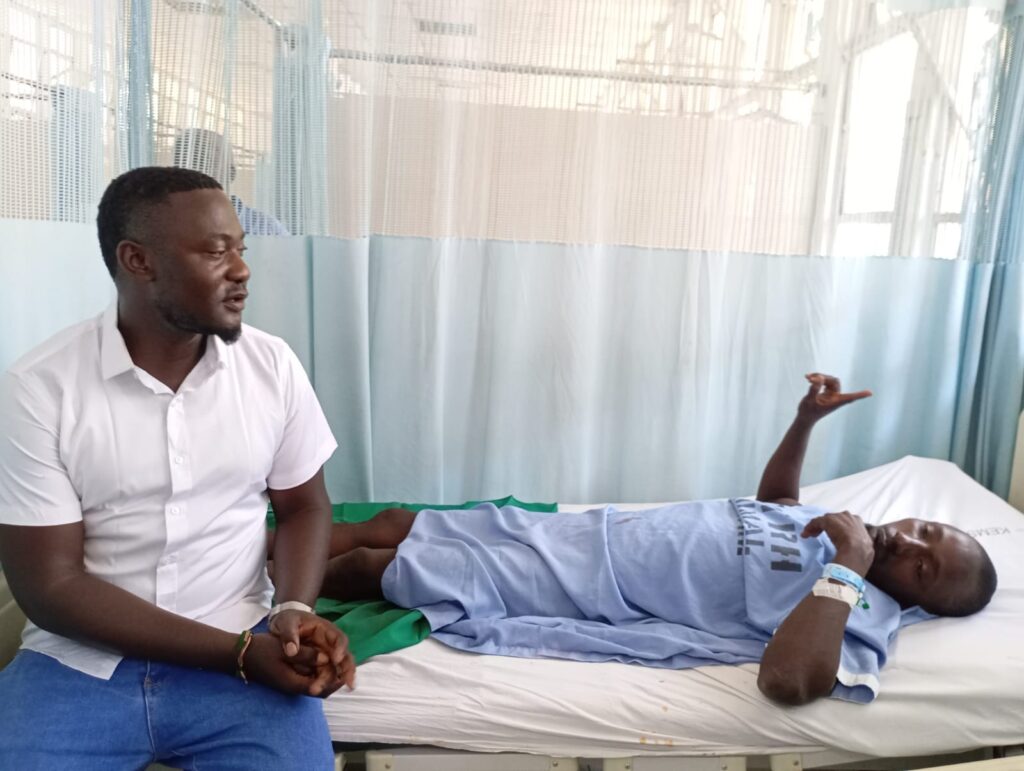It was during Wema’s routine outreach activities at Makadara Grounds, one of the main street bases in Mombasa town, that our social workers met Ali Bakari Katana. Ali had heard about Wema through the “street grapevine,” an informal network of whispers that spreads vital information among those living on the margins. Wema is known for its efforts to reach street-connected children, individuals often invisible to formal systems and to ensure they access essential services such as healthcare, education, and protection.
Although Ali was well past the age of a child, he approached Alex, one of our social workers, driven by pain and desperation. At 28, Ali had been suffering from an irreducible inguinal hernia, a painful condition he had endured for six long years. Once, he had been a hardworking man, surviving the streets of Mombasa by scavenging bottles and recyclable waste, and by offering manual labor to passersby and local businesses. His earnings, though meager, were enough to support his partner and two children in the nearby slums.
But as the hernia worsened, his ability to work faded. What began as mild discomfort something he could numb with glue-sniffing or marijuana soon turned into debilitating pain that changed the way he walked, caused frequent fainting spells, and ultimately stripped him of his livelihood.
Recognizing the urgency of Ali’s condition, the Wema team sprang into action. Our first stop was the Coast General Referral Hospital (CGRH) social work office, long-time collaborators who have often helped facilitate access to healthcare for street-connected persons. They assured us that if we could make the annual SHA payment on Ali’s behalf, he would be eligible for emergency surgery.
Wema covered the costs of his pre-surgery tests, consultations, and even provided a simple mobile phone to help him complete his SHA registration. On October 21, 2025, Ali successfully underwent hernia surgery. Three days later, on October 24, he was discharged a day that marked a new beginning for him.
Yet recovery posed a new challenge. The streets, harsh and unsafe, were no place for post-surgery healing. Once again, collaboration saved the day. Wema reached out to Mama Mtaa Samia, a respected community mother from Old Town, who graciously offered Ali a clean and secure space to recuperate.
Street-connected individuals like Ali remain among the most marginalized and excluded members of our society. They face multiple barriers to accessing healthcare, identification, education, and social protection. Without documentation, stable shelter, or income, they are often unseen and unheard in public health planning and social welfare programs.
Wema’s intervention in Ali’s case demonstrates what is possible when compassion, collaboration, and coordination meet. But such outcomes should not depend on chance encounters or the goodwill of a few.
It is time for government systems to design and implement inclusive policies that intentionally reach street-connected persons, policies that remove administrative and financial barriers, strengthen community outreach, and integrate social workers into healthcare systems. Every person, regardless of where they sleep or what they own, deserves access to health, dignity, and hope.

